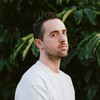The fourth-annual LA Podfest. Photo by the author
Annons
Annons
Then, in June of this year, comedian and—for lack of a better comparison—the Oprah of Podcasting, Marc Maron, pulled off the coup of interviewing Obama. If this couldn't legitimize the medium, nothing would. But, as with Serial, Obama's visit to chat with a comedian in his garage didn't seem to pull podcasts into the zeitgeist. Maron, who performed at Podfest over the weekend, told me that "it was an honor to do it—and then you kinda get back to business as usual.""Podcasts are never on unless you're choosing to listen to them." — Justin McElroy
Marc Maron at LA Podfest. Photo by the author
Annons
Justin McElroy, of the weekly comedic advice podcast My Brother, My Brother, and Me, shared similar concerns. "[Podcasts are] not really being curated for you in any way. I would bet the rate of people that just listen to one or two podcasts is a lot higher than the rate of people that just watch one or two TV shows.""TV is something you get pretty passively," McElroy continued. "It's on a screen. You walk into someone's house, you see a bug for it at the bottom of the screen while you're watching another show…Podcasts are never on unless you're choosing to listen to them."Related: These Are the Five Video Gaming Podcasts You Need in Your Life
Paul F. Tompkins. Photo by the author
Annons
Dustin Marshall's network, Feral Audio, tries to be more like a profit-sharing art collective than a business. This self-imposed independence has branded Feral Audio's collection of shows as sort of the quirky misfits of the space. But what they lack in corporate support, they make up for in their talent pool, with flagship podcasts like Community creator Dan Harmon's weekly pseudo-town hall meeting Harmontown, garnering upwards of two million downloads a month, according to Marshall."Everybody's trying to monetize this thing, but [Feral Audio is] mainly concerned with maintaining independence. There's 'big podcasting,' but we're more concerned with owning everything because then we don't have to worry about delivering to investors," Marshall told me.Sure, money and popularity are great. Nobody I talked to wouldn't love to make the next Serial. But it's the intimacy, earnestness, and creative freedom that seems to be the main reason podcasts inspire such passion among both listeners and producers—and that's why they aren't going anywhere anytime soon."I'm going to do this whether I make money or not," Tompkins said. "I really enjoy the form. I really enjoy the medium and I like that you can do whatever you want. You just have to buy your equipment and put it up."Thumbnail photo via Flickr user David Martín.Follow Justin Caffier on Twitter.Did you know our food channel MUNCHIES just started a podcast? Listen here.
